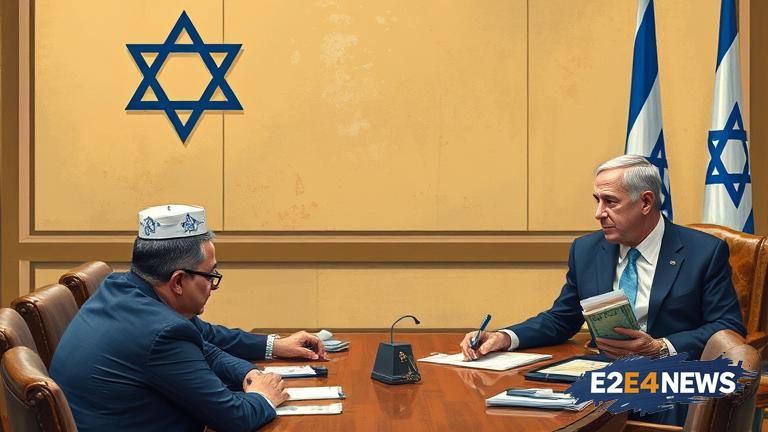The Israeli cabinet meeting, which was scheduled to take place on August 5, 2025, has been postponed, raising doubts over Prime Minister Benjamin Netanyahu’s plan to annex parts of the West Bank. The meeting was expected to discuss the proposed annexation, which has been met with widespread criticism from the international community. The postponement has sparked concerns that the plan may be facing opposition from within the Israeli government. Netanyahu’s plan to annex parts of the West Bank has been a major point of contention, with many arguing that it would be a violation of international law. The plan would see Israel annexing large swaths of land in the West Bank, including the Jordan Valley and the settlements. The move has been condemned by the Palestinian Authority, which has accused Israel of attempting to undermine the two-state solution. The international community has also expressed concerns over the plan, with many countries warning that it would have serious consequences for the region. The United States has been a key supporter of Israel, but even the US has expressed reservations over the plan. The European Union has been vocal in its opposition to the plan, with many member states warning that it would be a major obstacle to peace. The postponement of the cabinet meeting has been seen as a sign that the plan may be facing opposition from within the Israeli government. Some ministers have expressed concerns over the plan, citing the potential consequences for Israel’s relationships with other countries. Others have argued that the plan is necessary for Israel’s security, but that it needs to be implemented in a way that takes into account the concerns of the international community. The Israeli government has been under pressure to provide more details about the plan, including how it would be implemented and what the consequences would be for the Palestinian population. The Palestinian Authority has warned that the annexation would be a disaster for the Palestinian people, and would undermine any hopes for a two-state solution. The postponement of the cabinet meeting has been seen as a victory for those who oppose the plan, but it is unclear what the long-term consequences will be. The Israeli government has said that the meeting will be rescheduled, but it is unclear when that will be. In the meantime, the international community will be watching closely to see how the situation develops. The annexation plan has been a major point of contention in the Israeli-Palestinian conflict, and it is unclear how it will be resolved. The situation remains volatile, with many warning that the annexation could lead to widespread violence. The Israeli government has a responsibility to ensure that any actions it takes are in the best interests of all parties involved, and that they do not undermine the prospects for peace. The international community has a role to play in encouraging Israel to take a more constructive approach, and to work towards a two-state solution. The situation is complex, and it will require careful diplomacy and negotiation to resolve. The postponement of the cabinet meeting is a sign that the Israeli government is willing to listen to concerns and to consider alternative approaches. However, it is unclear what the long-term consequences will be, and the situation remains uncertain. The Israeli-Palestinian conflict is one of the most complex and intractable conflicts in the world, and it will require a sustained effort to resolve. The international community must continue to play a role in encouraging both sides to work towards a peaceful solution, and to avoid actions that could undermine the prospects for peace.





